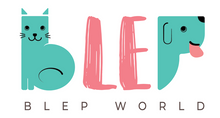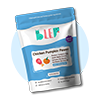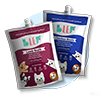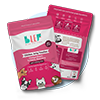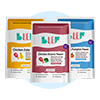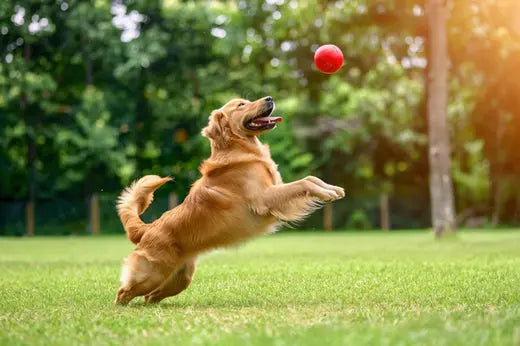The nutritional requirements of our beloved furry pets change significantly as they age. Like humans, senior cats experience age-related issues that can impact their energy levels, metabolism, and general health. At BLEP, we know that feeding a senior cat goes beyond just filling their bowl; it requires a tailored approach to meet their unique needs. That's why we offer a wide selection of cat foods, including meals made specially to meet the health requirements of senior cats.
In this blog, we'll cover how cat metabolism varies as they age, why it's crucial to adjust their diet, and how the right nutrition can help address common health issues.
Why Nutrition Matters for Senior Cats
Adjusting your cat's diet is essential as they age into their senior years, typically around the age of 7 or older. Senior cats have distinct caloric and nutritional needs that differ from those of younger cats. Feeding them food formulated for young adults may not provide the proper nutrition they require during this stage of life

1. Reduced Caloric Intake
As cats enter their senior years, their energy requirements decrease. With a more sedentary lifestyle, overeating can lead to weight gain and increase the risk of conditions such as heart disease, diabetes, and arthritis. When selecting food for senior cats, opt for options with higher vital nutrients yet lower in calories. BLEP offers a selection of cat food options for maintaining your pet's health and happiness while ensuring your pet receives the essential nutrients they need.
2. Adjusted Protein Levels
All cats need protein, but the type and quantity can become even more vital as they age. Senior cats may not be able to metabolize low-quality animal protein. That is why it is crucial to select nutritious food for cats that is easy on their digestive systems and has a moderate to high protein level. Look for cat food that features easily digestible, premium proteins like fish, turkey, and chicken. This helps preserve muscle mass without putting unnecessary strain on their kidneys.
3. Increased Hydration
Senior cats often struggle to stay hydrated, which can impact their urinary system and kidneys. It's important to ensure your elderly cat gets adequate water. Since many senior cats don't drink enough on their own, consider incorporating broth into their meals.
BLEP offers chicken broth for cats which is crafted with high quality chicken bones, chicken feet, organic apple cider vinegar, and turmeric. It is a great option for senior cats as it not only enhances hydration but also provides vital nutrients. Wet food is another excellent option, offering both hydration and essential nutrition.
4. Joint and Mobility Support
Senior cats commonly suffer from arthritis and joint pain, making it difficult for them to move around. Feeding them food high in glucosamine and omega-3 fatty acids can help them maintain joint health and prevent inflammation.
Our online food for cats selection includes ingredients like Tuna, Mackerel, Sardines and Fish oil which are high in omega-3 fatty acids. These unique nutrients provide support for joint mobility and increase your cat's comfort. Additionally, you can treat them with tasty fish-based snacks high in lipids to strengthen their joints.
Metabolism Changes in Senior Cats

1. Slower Digestion
As cats age, their digestive systems slow down. This results in decreased energy levels and can affect how they process food. It’s essential to choose options that are easy to digest and formulated for an aging metabolism.
2. Decreased Muscle Mass
Muscle loss, or sarcopenia, is a natural part of cat aging. Senior cats may experience a decline in muscle mass without adequate protein intake, which can affect their strength and mobility. Incorporating high-quality animal protein into your cat’s diet can help slow down muscle loss and maintain strength. BLEP's food for cats is loaded with high-quality protein sources to help maintain their muscles.
3. Weight Management
It's crucial to keep your elderly cat at a healthy weight. Being overweight can cause problems, including diabetes, rheumatoid arthritis, and heart disease. However, some elderly cats may struggle with weight loss due to malnutrition or other underlying medical conditions.
Feeding your cat a well-balanced diet that contains the appropriate number of calories to prevent weight gain is crucial. Cat food products from BLEP are formulated to give your cat just the right balance of calories and nutrients to support healthy weight management.
Managing Common Health Issues with Diet
Health issues are more common in older cats, many of which can be managed with the appropriate diet. Changing your cat's food can significantly impact their treatment, regardless of whether they have dental issues, diabetes, arthritis, or kidney illness.

1. Kidney Disease
Senior cats commonly suffer from kidney disease, and their diet can significantly impact how well this condition is managed. A diet higher in omega-3 fatty acids and lower in phosphorus may be necessary for cats with renal disease. These nutrients reduce inflammation and improve kidney function.
BLEP provides food for senior cats that can help maintain renal health by providing the proper nutrients. Maintaining your cat's hydration levels is crucial for the health of their kidneys, and you can do this by feeding them hydrating options like chicken broth
2. Diabetes
Diet can significantly influence the management of diabetes in cats. High-protein, low-carb diets can help regulate insulin levels and prevent blood sugar spikes. Our range of nutritious food options is ideal for senior cats with diabetes, and smaller, frequent meals can also aid in blood sugar control.
3. Arthritis and Joint Pain
Joint pain and arthritis are typical issues for senior cats. Glucosamine, chondroitin, and omega-3 fatty acids, can all help reduce inflammation and promote joint health. These nutrients are beneficial additions to meals for senior cats.
Fish oil, an excellent source of omega-3 fatty acids, is one of the ingredients that you will find in all of our cat food products. Cat meals high in omega-3, such as fish-based options, strengthen their joints even more.
4. Dental Health
Dental issues, such as tooth decay and gum disease, are common in older cats. If your cat has problems chewing dry food, try switching to wet food or adding chicken broth
For elderly cats with dental problems, BLEP provides a selection of tasty wet food meals that make chewing more comfortable while still providing the necessary nutrition.
Treats for Senior Cats
Treats can be a delightful addition to your cat’s diet, especially as they age. We provide treats for cats at BLEP that are nutrient-rich and beneficial to your senior cat. We offer the ideal solutions to enhance their diet, whether you're searching for high-protein foods to boost their muscles or fish-based meals high in omega-3 fatty acids for their joints.

Conclusion
Taking care of a senior cat requires a thoughtful approach to their evolving nutritional needs. From adjusting their caloric intake to supporting their digestion, muscle health, and management of age-related health issues, proper nutrition is crucial in ensuring your aging feline companion lives a long, healthy, and happy life.
At BLEP, we're committed to providing the best nutrition for cats, especially for those who are in their golden years. Check our online food for cats selection for everything your senior cat requires, from protein-packed meals to hydrating chicken broth and wholesome cat treats.
Take the time to evaluate your senior cat's dietary needs and discover the options available at BLEP to promote their health and well-being.
Give your elderly cats the indulgences they truly deserve!
